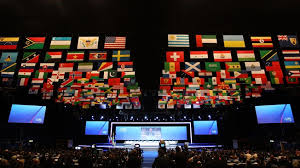By Andrew Warshaw in Paris
June 4 – It’s a fait accompli as they say in France. Gianni Infantino will be re-elected FIFA president in the French capital on Wednesday.
But there are some who take the view it should not be quite as straightforward as that. Infantino may be running unopposed but any federation that might wish to vote against him being handed a second term – or, more likely, abstain – will not have a chance to do so.
No-one would suggest that Infantino does not have majority support among FIFA’s 211 member associations. Even the German FA, which at one point indicated it may not support him, pledged its backing today to the present incumbent despite having had grave doubts in the lead-up to the FIFA Congress here.
Yet some experts believe that from both a legal and governance standpoint, the mechanism by which Infantino will move into a new four-year period in charge has crossed a line.
On Monday, the 37-strong ruling FIFA council “unanimously agreed” to propose a statute amendment that allows the next FIFA president to be elected by acclamation if there is no rival for the job.
In other words, no ballot. Merely a show of hands. Or a collective cheer of support. No opportunity to register any form of discomfort.
The new presidential statute was not immediately revealed to reporters after the FIFA Council meeting, possibly because it was deemed to be relatively inconsequential. It was later included in an official FIFA press release.
Infantino, who could never have imagined when he was general secretary of UEFA that he would see this day, seized his chance in February 2016 in the wake of the start of the FifaGate scandal that brought the organisation to its knees.
Having controversially overhauled FIFA’s ethics apparatus, including ousting its main investigator, he has consistently banged the drum for greater transparency, creating a coterie of trusted aides.
But despite his suave approach, not everyone has appreciated his management style with critics accusing him of being far too autocratic and opportunist.
Senior insiders with knowledge of the legal process point to his re-election as a case in point. However much it might be a formality, they believe the election should be conducted by open vote in the same way FIFA chose the 2026 World Cup hosts.
To allow the proposed new statute to go through to the vote it is understood that Congress will first have to vote on an amendment to the agenda.
“You can’t just change the rules a couple of days beforehand, or insert a new one,” said one insider linked to a high-ranking federation official.
“This is indicative of the way FIFA is heading under this administration. Who knows if anyone might have abstained? Maybe no-one would dare but that’s not the point. What will happen at the next election, or the one after that, if there is only one candidate? This is not the right way.”
Contact the writer of this story at moc.l1751589114labto1751589114ofdlr1751589114owedi1751589114sni@w1751589114ahsra1751589114w.wer1751589114dna1751589114

